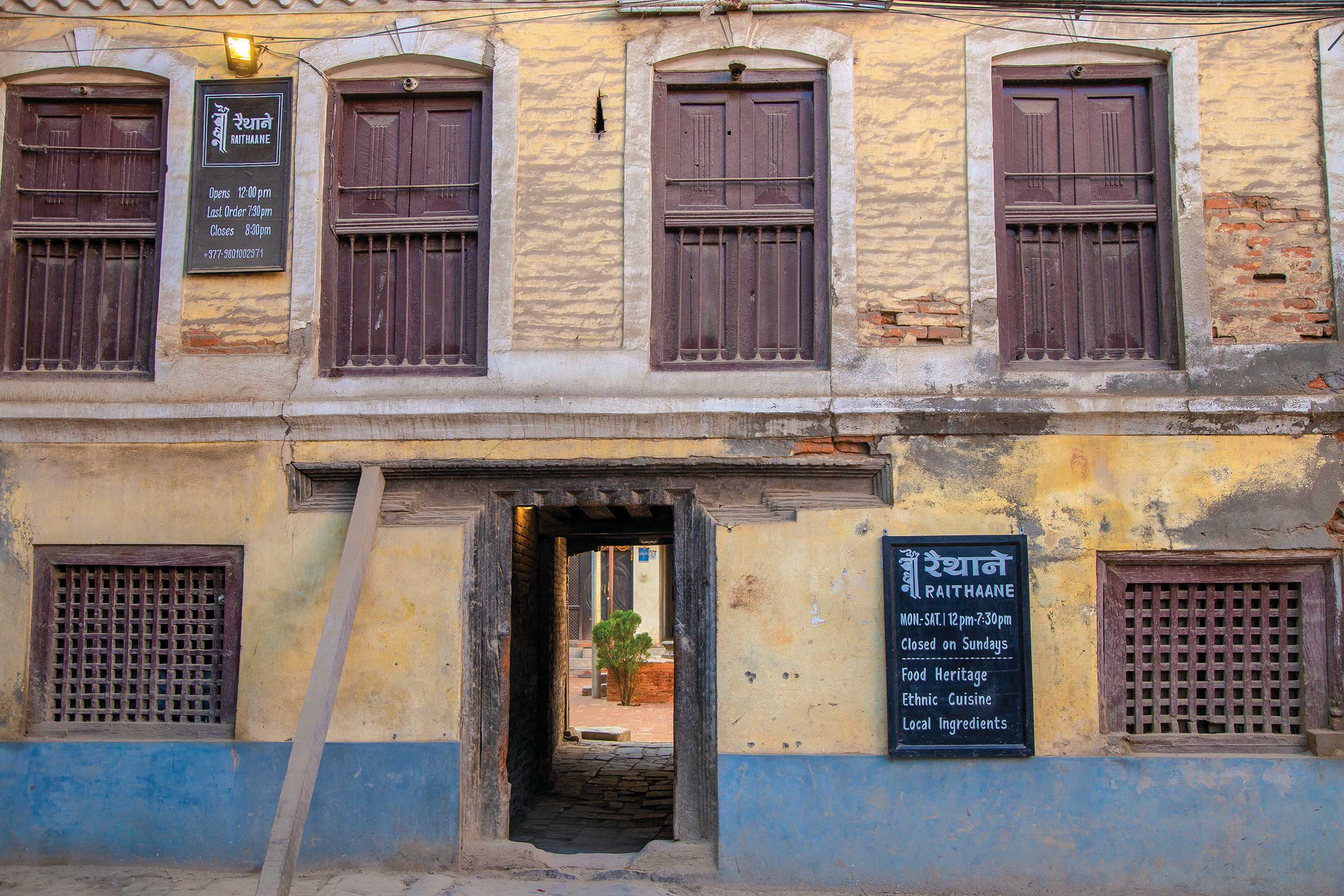"People eat what they grow or people grow what they like to eat”, says Wayne Freeman. “I think planners should keep this in mind.” Freeman is an agronomist with specialization in plant breeding who has been credited by some to be the first to introduce the “mansuli” variety of rice in Nepal. He was responding to my query as to why mansuli rice did not find as much favor in countries like Thailand, where it was introduced at the same time, as it did in Nepal. He adds, “Perhaps it’s a question of taste. As far as Nepal is concerned, it is very popular.” What could be the reason? He replies, “Mansuli has exceptional cooking quality and is quite aromatic.”
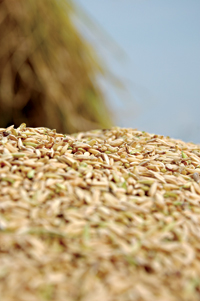 So, what was the story behind mansuli? “Its discovery was more of an accident,” he admits. “Basically there are two major types of rice, Oryza indica and Oryza japonica. At one time, some decades ago, it was observed that the far eastern countries were doing very well with rice cultivation and it was thought that it must be due to the superiority of the japonica variety. So, research was conducted in this sector which led to mansuli being produced as one of its cultivars.” Freeman was then working as a seed specialist in the Rockefeller Foundation’s Agricultural Program in India. He apparently introduced the variety in Nepal during his later posting here. “I was stationed here first in 1976 and retired in 1982. After that, I worked as a consultant till 1992.”
So, what was the story behind mansuli? “Its discovery was more of an accident,” he admits. “Basically there are two major types of rice, Oryza indica and Oryza japonica. At one time, some decades ago, it was observed that the far eastern countries were doing very well with rice cultivation and it was thought that it must be due to the superiority of the japonica variety. So, research was conducted in this sector which led to mansuli being produced as one of its cultivars.” Freeman was then working as a seed specialist in the Rockefeller Foundation’s Agricultural Program in India. He apparently introduced the variety in Nepal during his later posting here. “I was stationed here first in 1976 and retired in 1982. After that, I worked as a consultant till 1992.”
“The late Gyan Lal Shrestha of Parwanipur Rice Station (near Birganj in the Terai) was also involved in this.” It seems that Freeman and Shrestha began the first cultivation of mansuli rice in Nepal. The fact that the origins are a bit hazy is because Wayne Freeman is not in his prime today and cannot be faulted for not remembering more clearly. He is 95 years old as we speak. Yes, you heard right, ninety-five. Memories do become a bit clouded, which is not to say that he does not remember much. On the contrary, he is surprisingly sharp for his age and more amazing still, age hasn’t stopped him from traveling the world. We had this conversation at Hotel Himalaya, Lalitpur, in the second week of March this year. He was on a week-long visit. He would be leaving for Hyderabad a few days later to attend a workshop on rice on the 8th of April. After that, he would be flying back to Kansas in the United States to speak at a Leadership Council Meeting.
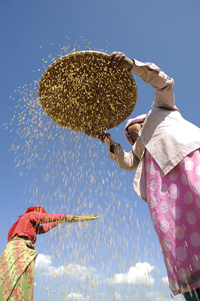 Age has not stopped him either from having yet more goals. “I am trying to establish a linkage between Kansas University and a university in South India,” he reveals. Freeman is a Rockefeller Foundation joint coordinator who was involved with the All-India Rice Improvement Program from 1966 to 1976. In fact, that is not all. Having continued to work as a consultant for many more years, he declares with some pride, “I have more than 50 years of experience working in the Indian seed sector.” Freeman is also a Board Member of the prestigious Barwale Foundation, Hyderabad, which has the following statement as its vision, ‘To work for alleviation of poverty and improve livelihoods by increased food security.’ Freeman smilingly discloses that he is referred to as the ‘visionary member’ of the Board. At this late stage in his life, his vision is to provide opportunities for sharing knowledge between his home state and India. One has to wonder at the man’s spirit. At an age when most people would have called it a day as far as any sort of activity was concerned, Freeman, at 95, is still on a mission to have yet another vision fulfilled.
Age has not stopped him either from having yet more goals. “I am trying to establish a linkage between Kansas University and a university in South India,” he reveals. Freeman is a Rockefeller Foundation joint coordinator who was involved with the All-India Rice Improvement Program from 1966 to 1976. In fact, that is not all. Having continued to work as a consultant for many more years, he declares with some pride, “I have more than 50 years of experience working in the Indian seed sector.” Freeman is also a Board Member of the prestigious Barwale Foundation, Hyderabad, which has the following statement as its vision, ‘To work for alleviation of poverty and improve livelihoods by increased food security.’ Freeman smilingly discloses that he is referred to as the ‘visionary member’ of the Board. At this late stage in his life, his vision is to provide opportunities for sharing knowledge between his home state and India. One has to wonder at the man’s spirit. At an age when most people would have called it a day as far as any sort of activity was concerned, Freeman, at 95, is still on a mission to have yet another vision fulfilled.
But, hold on, that’s not his only remaining vision. He lets me know that he is waiting eagerly for his book to be released by the end of this year. It is titled, “The History of the Indian Seed Industry.” And, here would be the right time to reemphasize that his mind remains quite sharp today. Talking about his family, he says, “I was married in January 1938.” He has a son and two daughters and plenty of grand children as well as great grand children. Regarding his obviously healthy longevity, he says, “My grandfather was born in 1812 and died in 1911. He lived for 99 years! On my mother’s side, her parents too lived to be in their nineties. So, perhaps it’s the genes.” He adds, “Recently my doctor told me that I had exceptionally good intestinal health. Maybe it’s due to the diet, you know, fresh greens and less meat.”
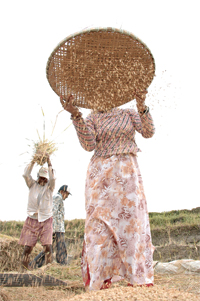 Freeman originally hails from Gatlinburg in Kansas which he says, “is right next to Smoky Mountain National Park, the most visited park in the United States.” Now he lives in Tennessee. He was one of the first to receive a scholarship from the National Youth Administration set up during President Roosevelt’s time, the purpose of which was to provide support to students wanting to go to college. Initially, Freeman wanted to be a veterinarian, but a summer job involving agronomy led to him changing his mind. In due time, after finishing his graduation in the subject from Kansas, he did his masters from Illinois, specializing in plant breeding.
Freeman originally hails from Gatlinburg in Kansas which he says, “is right next to Smoky Mountain National Park, the most visited park in the United States.” Now he lives in Tennessee. He was one of the first to receive a scholarship from the National Youth Administration set up during President Roosevelt’s time, the purpose of which was to provide support to students wanting to go to college. Initially, Freeman wanted to be a veterinarian, but a summer job involving agronomy led to him changing his mind. In due time, after finishing his graduation in the subject from Kansas, he did his masters from Illinois, specializing in plant breeding.
When the talk veers towards Kansas, Freeman recalls something that he is a bit excited about. “A certain Dr. Chu at the Kansas State University is doing work involving double haploid breeding. Right now the tests are being done on wheat but could as well be applicable to other cereals later on. If it is successful, it will be possible to grow cereals much faster than with the conventional cross bred varieties.” He also mentions a bansmati hybrid called RH10 developed by the Indian Agricultural Research Institute and which was introduced in India in 2005. Actually, this is where Freeman wants to comes into the picture. He wants to develop linkages between the United States and India so that such research can move ahead faster due to collaboration and joint efforts. No wonder the Barwale Foundation acknowledged that, “One of his (Wayne Freeman’s) most prominent contributions was to accelerate research and development on an interdisciplinary multi-location basis, which has become a model for IRRI’S International rice testing program also.” But, it seems that the 95-year-old is not yet satisfied with the status quo and is working towards speeding things up further.
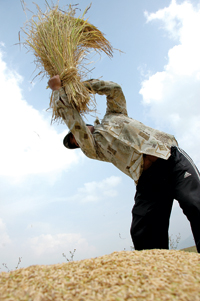 He is not satisfied with something else too. Right at the beginning of our talk, he had said that when he comes here, one of the things he was interested in knowing was whether the fruits of all the efforts put in over the decades have been realized. So, I ask him, “Do you think Nepal has been successful?” He looks sad when he says, “In relation to India, no.” Clearly, he is tempering his words.
He is not satisfied with something else too. Right at the beginning of our talk, he had said that when he comes here, one of the things he was interested in knowing was whether the fruits of all the efforts put in over the decades have been realized. So, I ask him, “Do you think Nepal has been successful?” He looks sad when he says, “In relation to India, no.” Clearly, he is tempering his words.




